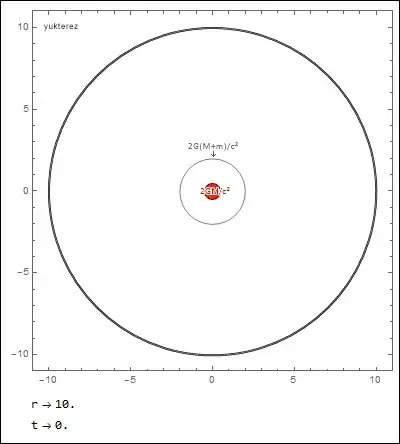None of the answers to this question or this question answer my question. Once an object falls past the event horizon, it can no longer act as a source of gravity. Also, if one tiny object falls into the black hole then later a larger object falls into the black hole, we can make a simplifying approximation that neglects the increase in size caused by the tiny object falling into the black hole and treat it is thought the tiny object doesn't change space-time at all. Then the tiny object will pass the event horizon in finite time long before the larger object falls into the black hole and makes it bigger. Even long after the larger object passes the event horizon, we will still see the tiny object as not yet having passed the event horizon. It seems like we can derive the contradiction that we see the tiny object near the event horizon of a larger black hole but I think I have the solution to it. Could this be the explanation of how an object can make a black hole bigger after it falls in?
The reason is similar to the reason why gravity can escape a black hole. The gravity outside a black hole is not caused by the matter in it. Instead, just like one Quora answer said, the gravitational field outside a black hole is a self-sustaining gravitational field.
Similarly after an object falls into a black hole, it is not the source of the stronger gravitational field. Instead, because of its own gravitational field, it changes space outside the black hole before it passes the event horizon then the stronger gravitational field sustains itself.
In the case where a tiny object falls into the black hole then a larger object falls into the black hole, after the larger object falls into the black hole, we're really seeing the tiny object from an earlier time before the black hole got bigger. That might make it's appearance look very weird because we're looking through the space outside a larger black hole into the space closer to the event horizon the way it was a long time ago before the black hole got bigger.
According to this answer, an object actually takes infinite time to reach the event horizon and after the black hole gets bigger, the object moves further away from the singularity with the event horizon but I believe that information is wrong. I think that's only what happens to a photon hovering at the event horizon from the way the event horizon is defined. The apparent horzion is where a photon can hover at a constant distance from the singularity but the event horizon is defined to be moving away from the apparent horizon exponentially because a photon following the apparent horizon will be unable to escape because the black hole will get bigger moving the apparent horizon further out and preventing the photon from escaping.
